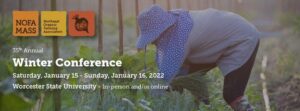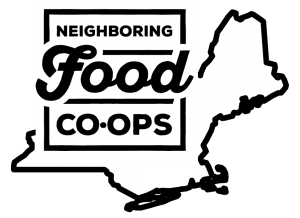 Your Neighboring Food Co-ops
Your Neighboring Food Co-ops
Locally Owned by More Than
160,000 People Like You!
- A Season for Reflection–And for Looking Forward
- Last Minute Gift? No Problem!
- Rochdale & The Early Co-operative Movement
- Co-operative Development Foundation: Building a Just Co-operative Ecosystem
- Why Co-operation Among Co-ops Matters
- Peer Networking Opportunities for Food Co-ops
- Co-op Jobs
- December’s Cave to Co-op Special
- Farmers Union: College Conference on Co-operatives
- Co-op Calendar
A Season for Reflection–And for Looking Forward
Looking back on a challenging year, we are particularly thankful for the solidarity of our member co-ops and partner organizations as we have worked to keep our communities healthy and safe, our local economies vibrant and resilient, and our food co-ops successful and growing.
And as we look forward, we are working together to build a better future — a regional food system and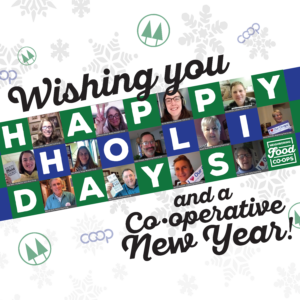 economy that is more just, inclusive, and sustainable.
economy that is more just, inclusive, and sustainable.
This fall, the Board of Directors and Staff of the Neighboring Food Co-op Association gathered for our annual retreat, focusing on this year’s Co-op Month theme of “Building Back for Impact.” As we celebrated a decade of growing the co-operative economy, we also worked to deepen our own relationships and our understanding of the challenges and opportunities before our member food co-ops and how we can support our shared success as we work to rebuild communities, increase access to healthy food, and grow more just and inclusive co-operatives.
“As we look toward to our 11th Annual Meeting in 2022, I want to thank our Board of Directors for their extraordinary service over the past year,” said Sue Miller, NFCA President and Co-General Manager of Upper Valley Food Co-op (VT). “And I’d especially like to encourage our Member Co-ops to consider running for the Board.”
As a co-operative of food co-ops, the NFCA and our work is overseen by a board elected by and from among our Member Co-ops.
“Serving on the NFCA Board offered great professional development and networking opportunities, and also gave me a way to feel connected to the broader co-op community,” said Faye, former President of the NFCA Board of Directors and outgoing Director at City Market, Onion River Co-op.
We invite you to join us in our work to create a thriving co-operative economy, rooted in a healthy, just and sustainable regional food system and a vibrant community of co-operative enterprise. For more information on eligibility for service on the Board, please e-mail info@nfca.coop. And please save the date for our 11th Annual Meeting, to be held online on Saturday, March 19, 2022.
Here’s to a Co-operative New Year!
Consider gift giving and special foods that share the love while helping your co-op to build a 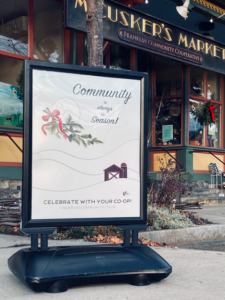 more healthy, just, and sustainable food system and a stronger local economy!
more healthy, just, and sustainable food system and a stronger local economy!
As Frances Moore Lappé points out in the 50th Anniversary Edition of “Diet for a Small Planet,” The single most important first step in rediscovering the traditional, healthy diet is changing where you shop. As long as you are wading through 15,000 choices in a supermarket, coming up with something healthy will seem like an incredible challenge. But if you are shopping in a community cooperative store filled with whole foods and foods from local producers, all your senses will be tantalized—but in the right direction for your health.
Lappé’s book makes a great holiday gift that offers hope and optimism and reminds us of the important role that we all can play in building food security, environmental sustainability, and economic democracy (the Neighboring Food Co-op Association makes a cameo appearance in the smoothie recipes section!).
It is also a reminder of the difference you make when you shop at your local food co-op, where you can find an abundance of gift offerings, including:
- Special Holiday Foods and Beverages and all of the ingredients you need for holiday celebrations like artisan and regional special cheeses for creating the perfect cheese platter or cheese ball or learn how to choose the perfect wine with River Valley Co-op’s virtual event.
- Make your own gift basket filled with Locally Made items or Personalized Themes for everyone on your list like these suggestions from GreenStar Food Co-op’s Gift Guide or ideas from Littleton Food Co-op’s awesome offerings or at Fiddleheads Food Co-op, peruse the household department items in your co-op!
- Food as gifts, learn to make special foods to give as gifts or for shared meals. Check out your co-op’s cooking classes like Co-op Food Stores offerings or try something new like City Market’s livestream cooking and baking sessions or with the kids in Monadnock Co-op’s virtual series specially designed for young people.
- Share the love. Make a donation in a love-one’s name via a co-op like Putney Food Co-op’s giving tree or honor them by contributing to co-op education like the Co-operative Development Foundation.
- Can’t decide what to get your loved ones? Our co-ops like Belfast Co-op have gift cards or gift of co-operation with a membership in your local food co-op or start-up like Dorchester Food Co-op. Great for mailing too!
However you choose to celebrate this season, you can find all of the ingredients you need for to bring joy to friends and family, whether near or far — and a more inclusive and sustainable community — at the co-op!
Rochdale & The Early Co-operative Movement
On the night of December 21, 1844, a group of working people and community activists  opened the doors to a humble, member-owned co-operative grocery store in the North of England.
opened the doors to a humble, member-owned co-operative grocery store in the North of England.
Stocked only with basic items such as butter and oats, the store seemed extremely modest at first, and many mocked their efforts at the time. The local gas company also refused to serve them, so they were forced to light the store with some of the candles from their own shelves. But the Rochdale Society of Equitable Pioneers were not deterred, and the practices that they put in place at their successful co-op were later adopted by the International Co-operative Alliance (ICA), building on a movement for economic democracy that today includes more than a billion people around the world.
In this webinar developed for the National Farmers Union, Erbin Crowell, Executive Director of the Neighboring Food Co-op Association, discusses the origins of the Rochdale Society of Equitable Pioneers, the challenges that they were trying to address, and how their legacy remains relevant today. Resources for further study are also included.
To view this and other webinars, visit the NFCA YouTube Channel.
CDF: Building a Just Co-operative Ecosystem
Building a Just Co-operative Ecosystem with the Cooperative Development Foundation
Based in Washington, DC, the Cooperative Development Foundation promotes self-help and 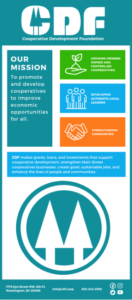 mutual aid in community, economic, and social development through co-operative enterprise. CDF is a thought leader in the use of co-operatives to create resilient communities, including the housing and care needs of seniors and people living with disabilities.
mutual aid in community, economic, and social development through co-operative enterprise. CDF is a thought leader in the use of co-operatives to create resilient communities, including the housing and care needs of seniors and people living with disabilities.
Through its funds, fiscal sponsorships, and fundraising, CDF makes grants and loans that foster co-operative development domestically and abroad. Support for cooperative research, sponsorships of education events and scholarships, and development of education materials and programs are funded through the Cooperative Education Fund. The Cooperative Development Fund focuses on co-operative development, research, and technical assistance with particular emphasis on cooperatives serving the needs of seniors, providing affordable housing, and building resilience in the developing world. Through the Disaster Recovery Fund, CDF provides grants to co-operatives impacted by disaster.
Understanding the value of co-operative research, CDF also sponsors efforts to identify, understand, and break down the co-operative difference. CDF published the 2020 Home Care Cooperative Benchmarking Report By the Numbers: Successes and Continuing Challenges in partnership with the ICA Group. Most recently, CDF partnered to publish the Diversity, Equity & Inclusion (DEI) Trends in the Cooperative Community report. This report was authored by Dr. Laura Hanson Schlachter, researcher at the University of Wisconsin Center for Cooperatives and based on a survey of National Cooperative Business Association CLUSA International (NCBA CLUSA) members.
Additionally, CDF hosts annual fundraising events to engage cooperators to further strengthen and honor our co-operative ecosystem. The Cooperative Hall of Fame honors co-operative heroes who have positively impacted and inspired co-operative efforts and serves as a major fundraise for the Foundation. The Co-op 5K is a fun, family- friendly fundraiser to support cooperative development nationwide.
A longtime partner of the Neighboring Food Co-op Association, CDF will embark on a new collaboration with NFCA in 2022. CDF will partner with NFCA to support small, rural food co-ops in the Northeast as they recover from the pandemic by providing technical support in governance, management and membership engagement and development. Additionally, a project that seeks to explore the potential for wholesale distribution of products grown by primarily Black farmers in the Southeast through retail grocery co-ops in the Northeast will also be completed, in collaboration with the Federation of Southern Cooperatives. Both projects are funded through USDA from the Rural Cooperative Development and Socially Disadvantaged Group grants. Our long-term partnership is visible in NFCA’s consistent sponsorship of the Cooperative Hall of Fame and the Co-op 5K as well as CDF’s support for the NFCA’s Annual Meetings and educational activities.
Support the only foundation in the U.S. devoted solely to the development of co-operatives across sectors by making a year-end donation. Your contribution can position CDF to accomplish even more in 2022. It’s also not too early to join the Neighboring Co-operators Team for the Co-op 5K in April 2022 — or plan a team for your food co-op!
Why Co-operation Among Co-ops Matters
To congratulate Flatbush Co-op on their 45th Anniversary, the Neighboring Food Co-op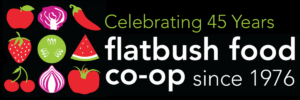 Association staff team made a quick video celebrating their success and sharing what’s possible through intentional co-operation.
Association staff team made a quick video celebrating their success and sharing what’s possible through intentional co-operation.
In 1976, a small group of community members founded a buying club to bring organic food to Brooklyn. Since then, Flatbush Food Co-op has established itself as a co-operative business that works to serve its neighbors and community in Brooklyn, NY. Congratulations to the member-owners, co-op board and staff, and community on your 45th Anniversary, Flatbush Food Co-op!
And Flatbush Food Co-op is part of something much bigger with the 40 food co-ops of the Neighboring Food Co-op Association! Our network of more than 40 food co-ops and startups is locally owned by 164,000 people, employing more than 2,400 people, and generating $382 million in revenue in 2020. And as a member of the NFCA, Flatbush Food Co-op contributes to the shared success of food co-ops across our region and also helps to grow the next generation of startup co-ops.
What’s possible when co-ops intentionally collaborate guided by a shared collective vision?
Peer Networking Opportunities for Food Co-ops
Opportunities for online collaboration support Food Co-op networking, mutual support, and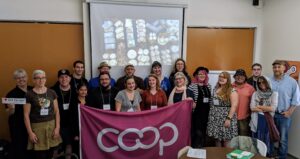 business success.
business success.
Building on the success of NFCA’s Peer Dialogs in 2021 as an effective means for our food co-op leaders to collaborate online and share ideas, resources, and innovations to enhance their impact in their own communities and across our region, we are excited to announce the schedule of upcoming Peer Dialogs for early 2022. Preceding each dialog, participants will receive an invitation to register via e-mail invitations to register via email.
NFCA Peer Dialog: Prepared Foods Department Staff
* Jan 13 @ 2:00 pm (tentatively 2nd Thursday of each month: Apr 14, July 14, Oct 13)
NFCA Peer Dialog: HR Department Staff
* Jan 18 @ 2:00 pm (tentatively 3rd Tuesday of month: April 19, July 19, Oct 18)
NFCA Peer Dialog: Board Presidents & Leaders
* Jan 19 @ 6:30 – 8 pm (tentatively 3rd Wednesday of month: April 20, July 20, Oct 19)
NFCA Peer Dialog: Bulk Department Staff
* Feb 3 @ 2 pm (tentatively 1st Thursday of month: May 5, Aug 4, Nov 3)
We look forward to another year of co-operation and good dialoging with you in 2022!
For more information on participating in NFCA Peer Dialogs, please contact: info@nfca.coop
When you work at your local food co-op, you’re part of something bigger: You’re also helping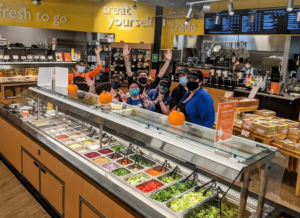 to grow a more healthy, just & sustainable food system that works for everyone!
to grow a more healthy, just & sustainable food system that works for everyone!
Want to develop new skills, advance your career, and do meaningful work for a business that makes a difference in your community? Come join the co-op team!
From our beginnings, co-ops have been guided by a commitment to shared values of democracy, equality, equity, and solidarity. And across our region, food co-ops have been pioneers in healthy food, sustainable agriculture, and building a more inclusive economy that works for everyone.
And working together, we are increasing our impact. Our food co-ops are locally owned by over 164,000 members, generate annual revenue of more than $382 million, and sell more than $100 million in local products. We also sustain good jobs in the community, employing 2,460 people – 65% of whom are also members, sharing in the ownership of their food co-ops.
Not only is working at your local co-op truly meaningful, it’s also fun working with others who also want to help build a better world. We’d love for you to be part of our co-op community and work to build a more healthy, just, and sustainable food system and a more inclusive economy.
Get more info and to help spread the word: https://nfca.coop/co-opjobs.
December’s Cave to Co-op Special
Organic Triple Cream with Truffles, Champlain Valley Creamery, Middlebury, VT
The texture of his Organic Triple Cream is velvety, and the flavor is full of milky sweetness, and it melts like butter in the mouth. It is a delightful cheese, with a beautiful soft ripened triple cream and a bloomy rind, earthy and with hints of mushroom and a thin layer of Italian black truffles.
Champlain Valley uses is 100% grass-fed organic Jersey cow milk from Severy Farm in Cornwall, VT, about 15 minutes from the creamery in Middlebury.
Champlain Valley Creamery uses traditional techniques and small batch pasteurization to produce their cheese entirely by hand in a net-zero solar-powered building. The triple cream is hand-ladled into forms after setting and aged for 10 days creating the lovely bloomy rind.
The winter holiday season is a great time to try artisan cheeses on a cheese board or in gift baskets. Hosting a special meal or family gathering? Try this recipe using Truffle Triple Cream with Truffles and Mashed Potatoes. You can find more information, photos and recipes on our December Cave to Co-op page.
Each month our Cave to Co-op partnership between Provisions International and the Neighboring Food Co-op Association (NFCA) offers a delicious regional cheese featured at a great price. Strengthening our local and regional farmers and producers by supporting artisanal cheesemakers is a key goal of the Cave to Co-op program.
Truffle Triple Cream Mashed Potatoes
* 2 pounds Yukon Gold potatoes (about 6 medium potatoes), peeled and cut into 1/2-inch slices
* 3 medium garlic cloves, peeled
* Kosher salt
* 1 1/4 cups heavy cream
* 1/4 cup cold unsalted butter, cut into pieces
* 2 Champlain Valley Truffle Triple Cream rind removed and cut into pieces, at room temperature
* 3 ounces Parmigiano-Reggiano cheese, grated (about 1 1/3 cups)
- Place potatoes in a large saucepan, add cold water to cover by 1 inch. Add garlic cloves and a generous pinch of salt. Bring to a boil over high. Reduce heat to medium-high, and simmer, uncovered, until potatoes are fork-tender, 10 to 12 minutes. Drain, and let stand at room temperature until potatoes look dry and chalky, about 10 minutes.
- While potatoes dry, bring heavy cream and butter to a gentle simmer in a small saucepan over medium, stirring occasionally, until butter is melted, about 5 minutes. Remove from heat. Press potatoes and garlic cloves through a ricer or mash well and return to saucepan. Fold cream mixture into potatoes.
- Return saucepan to heat over medium-low. Add cheese in batches, stirring after each addition until cheese is fully melted and incorporated.
Farmers Union: College Conference on Co-operatives
Every February, students from across the U.S. gather for College Conference on Co-operatives, organized by the Farmers Union to educate, motivate, and inspire the next generation of co-operators!
For over ten years, the Neighboring Food Co-op Association (NFCA) has partnered with the New England Farmers Union to support the success of our family farmers and fishers, advocate for agricultural policies that strengthen our regional food system and grow the co-op movement. Central to our collaboration has been investment in co-operative education.
One example has been supporting the participation of students from our region in the Farmers Union’s annual College Conference on Cooperatives. This year, the conference will be held online on February 18, and registration is free. Over the course of conference, participants hear from experts in the field, participate in interactive learning activities and workshops, and get a behind-the-scenes look at local co-ops. The event attracts students from across the country and is beneficial to those new to co-ops as well as those with some previous co-op education.
If you know of any students and young people who would be interested in this opportunity, please send them to https://nfu.org/ccoc/ for more information.
Past participants have spoken highly of the experience, including Anastasia Maher, who was a student at Simmons University and staff member at Littleton Food Co-op in Littleton, NH, and Sansha Khakhar, a candidate for the Certificate in Applied Research on Co-operative Enterprises through the Economics Department at UMass Amherst, who participated in 2019.
“It was an eye-opening experience to see the co-operative business model reflected in a number of different industries in and to hear about its national scale from other conference participants,” said Anastasia. “The best part was being able to reflect on the commonalities of our co-operative experiences; everything from being guided by the same principals to having the same go-to snacks at a food co-op. As a student, it was great to be surrounded by other like-minded students as we reflected on how we can integrate co-ops into our future.”
“The conference was an amazing experience for me to get exposed to different types and sizes of co-operative organizations,” said Sansha. “Before the conference, I was only aware of relatively small-scale worker and food co-ops. Through the conference, I was able to learn about the magnitude that co-operatives can reach and the potential economic and social impact they can make in communities.”
Other students from our region that have participated in the conference over the years have included Mikaela Allen, staff person Littleton Food Co-op in New Hampshire; Tyler (Riv) Gallagher, a student at Greenfield Community College in Massachusetts; Avery Gratton and Paula Scharpf, staff at the Willimantic Food Co-op in Connecticut; and Marcus Smith, UMass undergraduate and recipient of the Certificate in Applied Research in Co-operative Enterprise.
“As a student, I have been focused on the connections between co-operative enterprise and sustainable food systems,” said Marcus. “I was appreciative of this unique opportunity to learn about the diversity of co-ops and their role in the economy.”
For more information, visit: https://nfu.org/ccoc/
Members of NFCA Food Co-ops receive a 20% discount on registration with code.
For More Co-op Events, Visit https://nfca.coop/calendar
The Neighboring Food Co-op Association (NFCA) is a co-operative federation of over 40 food co-ops and startup initiatives across New England, working together toward a shared vision of a thriving co-operative economy, rooted in a healthy, just, and sustainable food system and a vibrant community of co-operative enterprise.


